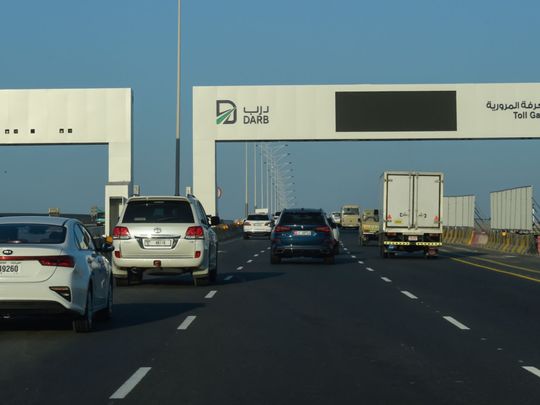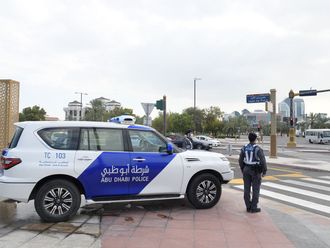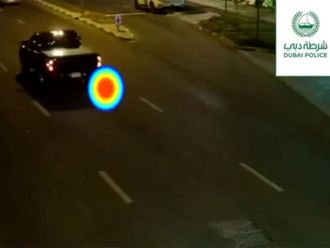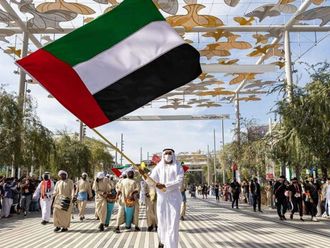
Abu Dhabi: It has been a year since the Darb toll gates became operational in Abu Dhabi. Tolls at the gates are effective for four hours every day.
Since the introduction of the toll gates, residents have adopted alternative driving behaviours that best suit their budgets, with some choosing to visit destinations closer to their homes during the traffic peak hours, when tolls are charged. Others added that the overall effect on their expenses in the first year of Darb operations has been quite manageable and that there are likely to be real long-term benefits from the revenue generated by the tolls.
There are currently four Darb toll gates in Abu Dhabi, one each on the four routes connecting Abu Dhabi island to the mainland. During the morning and evening peak hours, designated as 7am to 9am and 5pm to 7pm every day, each vehicle is charged Dh4 for passing under the gates.
The emirate’s public transport regulator, the Department of Municipalities and Transport’s Integrated Transport Centre (ITC), told Gulf News that a total of 41 million vehicles passed under the toll gates during the peak hours during 2021. There are currently 1.7 million registered vehicles on the Darb system.
Mindful of toll charges
“I pass the Al Maqta Bridge toll gate every day to and from work, because I live in Sas Al Nakhl and my office is in downtown Abu Dhabi. In a month, this means I pay about Dh200 in Darb tolls,” Naser Al Hammadi, 31, an Emirati human resources executive, told Gulf News. “Initially, I attempted to bring about a change in my work commute timings, but they were not sustainable. Having said that, I do set some weekend plans so that I do not have to pay the toll,” he added.
Daniel Andrews, 23, a Lebanese public relations executive, said he too was mindful of the toll, even though he did not have to pay toll charges when commuting to work every day. “I believe I have had to spend less than Dh100 a month so far. In fact, I usually get charged only when heading to Yas Mall, so I usually minimise trips during the peak hours. At the same time, I have found the expense to be quite affordable so far,” he said.
Reasonable expense
Cameron Hurion, 28, a British communications executive, was also pleasantly surprised to find that Darb tolls did not represent a sizeable addition to his expenses in 2021. “I have lived in other cities with road tolls and when I checked my Darb account before going on leave last year, I was delighted to find that I still had a balance. Other toll systems that I have faced have certainly set me back more,” he said.
In fact, Abu Dhabi’s Darb system has a daily toll cap of Dh16 per vehicle and there is no toll on Fridays and outside the daily peak hours. Certain categories of vehicles are also exempt from toll charges, including taxis, buses, emergency response vehicles and vehicles owned by people of determination, among others. Finally, there are also monthly caps on each vehicle.
Like many others, Adel Al Hammadi, 42, an Emirati resident, said he too had not had to change his driving behaviour in view of the tolls. “I have to use the Musaffah Bridge or the Sheikh Zayed Bridge for my daily commute, so I rack up about Dh70 in monthly toll charges,” he said.
Al Hammadi added that road tolls are, however, likely to improve road infrastructure in Abu Dhabi. “I don’t know if traffic flow has changed as a result of the tolls, simply because people’s working hours are still the same. But I can see the amount of road works being undertaken to improve the road network in Abu Dhabi. The road tolls collected can only support such projects."
Benefit for road network
Residents said that since the launch of the Darb system, by and large, traffic flow in the city has been quite smooth. “I myself haven’t faced any traffic jams in the city since they came into effect,” added Laney Hill, an American teacher in Abu Dhabi.
Jacob George, 46, a project expediting manager from India, spends Dh150 a month on Darb tolls. “I live in downtown Abu Dhabi and my office is located in Musaffah. So I cross the Al Maqta Bridge toll gate every day during the morning peak hours and sometimes in the evening as well. I have found the toll charges to be quite reasonable in 2021 and the Darb application is extremely user-friendly as well,” he said.
Registration on the toll system
Owners of vehicles registered in Abu Dhabi are automatically entered on to the Darb system and any toll that remains unpaid due to insufficient Darb account balance is charged at the time of renewal of vehicle registration. As a result, owners of vehicles registered in Abu Dhabi do not have to incur any penalty on account of overdue Darb toll. Owners of vehicles registered outside Abu Dhabi, however, must register their vehicles on the Darb system and ensure they have sufficient account balance while passing under a toll gate. Otherwise, fines are imposed.
















